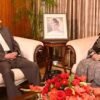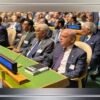KARACHI: In a landmark session today, the Karachi Water and Sewerage Services Improvement Project (KWSSIP), in collaboration with the National Rural Support Programme (NRSP), continued its efforts to uplift women in Karachi’s slums.
The session, held at a local church in Essa Nagri, was led by Gender Specialist Saina Ali and attracted a large crowd of women and young girls eager to participate in the women change agents identification drive.
This initiative aims to empower marginalized women, encouraging their active participation in community-led projects that address the pressing WASH challenges in their neighborhoods. Speaking to media representatives, Saina Ali emphasized, “This drive is designed to prepare women to take leadership roles in their communities, particularly in improving WASH conditions. Through our capacity-building sessions, these women will also become more aware of their legal rights and how to combat gender-based violence (GBV).”
She further added, “We are not just talking about awareness; we are preparing them to be agents of change. These women will be a part of the larger Community-Based Organization (CBO) we are forming under the project in Essa Nagri, and they will be at the forefront of addressing issues related to water, sanitation, and hygiene.”
The event also featured testimonials from attendees who expressed their enthusiasm for the initiative. “I feel more empowered now that I know my rights and how I can contribute to making our community a better place,” said one participant. Another young woman remarked, “This session has opened my eyes to the importance of WASH in our daily lives and how we, as women, can drive positive change.”
The KWSSIP project, funded by the World Bank, is committed not only to improving water and sanitation services but also to ensuring that women in low-income communities like Essa Nagri are integral to these efforts. By empowering women to take active roles in decision-making and community engagement, KWSSIP aims to create a lasting impact on both the WASH conditions and the social fabric of Karachi’s slums..



